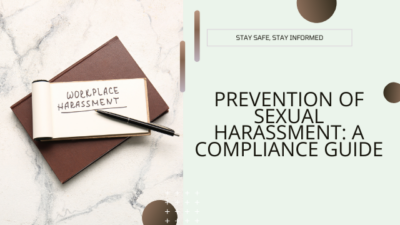Introduction
Workplace safety and dignity are fundamental rights of every employee. The Prevention of Sexual Harassment (POSH) Act, 2013, was enacted to create a harassment-free workplace. Compliance with the Act ensures legal protection, promotes inclusivity, and fosters a safe working environment.
Understanding Sexual Harassment
Sexual harassment includes any unwelcome act of a sexual nature that creates a hostile work environment. It can be:
- Verbal: Comments on appearance, sexual jokes, inappropriate questions.
- Non-Verbal: Staring, lewd gestures, suggestive notes.
- Physical: Unwanted touch, advances, or assault.
- Visual/Digital: Sharing inappropriate images, messages, emails, or videos.
Key Provisions of the POSH Act, 2013
- Who is covered?
- Employees, interns, contractual workers, clients, vendors, and visitors.
- Internal Complaints Committee (ICC):
- Organizations with 10+ employees must establish an ICC to handle complaints.
- Confidentiality:
- The complainant’s identity, details of proceedings, and outcomes must remain confidential.
- Time-bound Redressal:
- Complaints must be resolved within 90 days.
- Legal Consequences for Non-Compliance:
- Organizations failing to comply may face penalties, fines, and loss of business licenses.
Employer’s Compliance Responsibilities
To ensure compliance with the POSH Act, every employer must:
✅ Form an ICC: Appoint trained members, including an external expert.
✅ Develop a POSH Policy: Clearly define sexual harassment, complaint procedures, and disciplinary actions.
✅ Conduct Awareness Training: Educate employees and managers about workplace harassment.
✅ Ensure Prompt Action: Investigate complaints fairly and take appropriate disciplinary measures.
✅ Display POSH Guidelines: Publish policies and contact details of the ICC prominently.
Employee’s Role in Compliance
👩💼 Respect workplace ethics – Treat all colleagues professionally.
📢 Report harassment cases – Speak up against misconduct.
🛑 Do not engage in inappropriate behavior – Be mindful of actions and words.
🎓 Attend POSH training – Stay informed about rights and responsibilities.
Filing a Complaint Under the POSH Act
1️⃣ Written Complaint: Must be submitted to the ICC within three months of the incident.
2️⃣ Investigation Process: ICC will hear both parties, gather evidence, and interview witnesses.
3️⃣ Resolution & Actions: The ICC recommends corrective action, including warnings, suspension, or termination.
4️⃣ Appeal Option: If dissatisfied, the complainant can appeal to higher authorities.
Consequences of Non-Compliance
❌ Fine up to ₹50,000 for not implementing POSH policies.
❌ Increased penalties for repeated violations.
❌ Risk of business license cancellation.
❌ Legal actions against senior management in severe cases.
Conclusion
POSH compliance is not just a legal requirement but a moral obligation. A well-implemented POSH policy fosters trust, increases productivity, and ensures workplace dignity. Prevention, awareness, and timely action are key to building a safe and inclusive work culture.

